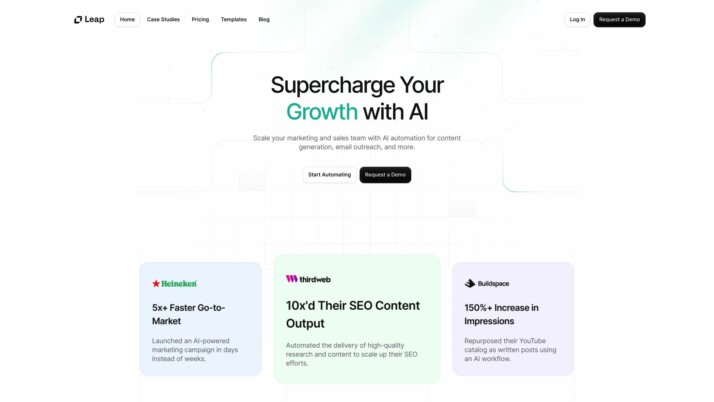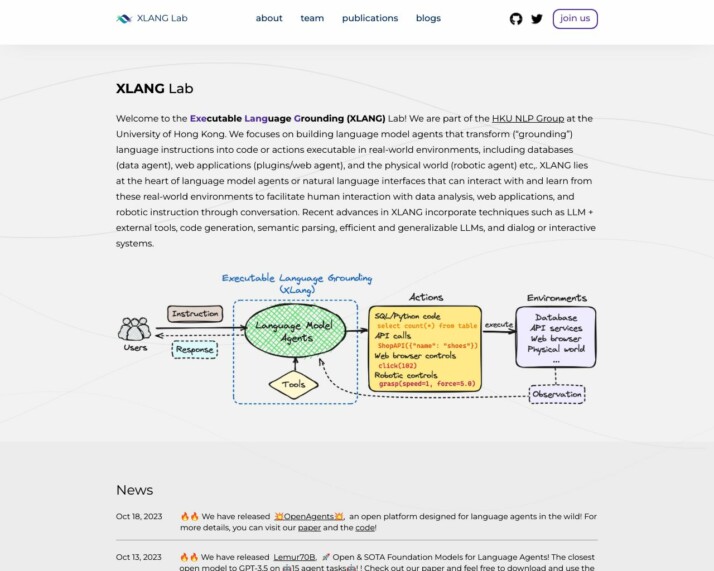Leap AI vs. OpenAgents: Comparing AI Development Platforms
AI platforms empower businesses to harness cutting-edge technology for improved efficiency and innovation. This review compares Leap AI vs. OpenAgents, and SmythOS, three leading AI solutions catering to diverse needs. Leap AI offers no-code AI workflow creation, while OpenAgents specializes in data analysis and web automation. SmythOS distinguishes itself with advanced features like hosted agents and multi-agent collaboration. We’ll explore each platform’s strengths, limitations, and ideal use cases to help you determine the best fit for your AI development goals. Whether you’re a developer seeking powerful APIs, a business leader focused on scalability, or a non-technical user looking for intuitive tools, this comparison provides valuable insights to guide your decision-making process.
Leap AI Overview
Leap AI empowers users to create sophisticated AI workflows without coding expertise. The platform offers a drag-and-drop interface for building AI-powered applications, ranging from content generation to image creation and music production.


Screenshot of Leap AI Website
Leap AI empowers users to create sophisticated AI workflows without coding expertise.
Leap AI’s comprehensive SDK support (RESTful API, TypeScript, Python) facilitates seamless integration into various applications. The platform boasts an extensive template library, enabling rapid development of AI solutions for tasks like blog post generation, music creation, and lead summarization.
A key strength of Leap AI lies in its support for diverse AI models, including OpenAI GPT, Mistral 7b, Claude 3 Opus, and Stable Diffusion XL. This versatility allows users to tackle a wide array of AI tasks efficiently. The platform also offers robust integration capabilities with popular tools such as Slack, Hubspot, Zendesk, and Microsoft Power Platform.
Leap AI’s user-friendly interface allows for visual design and execution of workflows directly from the dashboard. Advanced users can fine-tune and train custom models using their own datasets, enhancing the specificity and accuracy of AI outputs.
While Leap AI excels in many areas, it lacks some features found in more comprehensive platforms. The absence of hosted agents, autonomous agents, and advanced debugging tools may limit its applicability for complex enterprise scenarios. Additionally, the platform does not offer explicit support for multi-agent collaboration or constrained alignment, which could be crucial for certain AI applications.
OpenAgents Overview
OpenAgents revolutionizes AI integration with its open-source platform for creating, hosting, and managing AI agents. The system centers on three specialized agents: Data Agent for complex data analysis, Plugins Agent with over 200 integrated tools, and Web Agent for autonomous web browsing.


Screenshot of OpenAgents website
Data Agent excels in processing large datasets, generating insights crucial for roles like marketing analytics. The Plugins Agent stands out with its vast array of tools, adapting to diverse user needs from weather checks to online shopping. Web Agent, equipped with a Chrome extension, streamlines internet navigation by automating browsing tasks.
OpenAgents emphasizes user-friendliness, offering a web UI and backend server that facilitate easy communication with agents.
OpenAgents emphasizes user-friendliness, offering a web UI and backend server that facilitate easy communication with agents. This design makes advanced AI capabilities accessible to non-expert users, bridging the gap between technical complexity and practical application.
The platform’s vision extends beyond general interactions, aiming to provide tangible solutions for real-world challenges. By focusing on data analysis, web browsing, and task automation, OpenAgents brings AI assistance into everyday contexts, making it a valuable tool for both individual users and businesses seeking to leverage AI technologies efficiently.
However, OpenAgents faces limitations in certain areas. It lacks hosted agents for development and production environments, potentially complicating deployment for some users. The absence of autonomous agents and debug mode may restrict advanced customization and troubleshooting. Additionally, the platform doesn’t offer a hosted vector database or specific support for data lake integration, which could limit its application in large-scale data processing scenarios.
Feature Comparison
Leap AI and OpenAgents offer distinct approaches to AI agent development, with notable differences in their core components and security features. Leap AI excels in providing a user-friendly interface with its drag-and-drop visual builder and no-code editor, making AI development accessible to users without extensive coding knowledge. However, it lacks some advanced features like hosted agents and autonomous agents, which limits its applicability in complex enterprise scenarios.
OpenAgents, on the other hand, focuses on specialized agents for data analysis, web browsing, and task automation. Its Data Agent stands out for complex data processing, while the Plugins Agent offers extensive tool integration. However, OpenAgents also lacks hosted agents for development and production environments, which could complicate deployment for some users.
In terms of security, Leap AI implements multi-layer encryption and supports OAuth for secure authentication, giving it an edge in data protection. OpenAgents’ security features are less prominently highlighted, potentially making Leap AI a stronger choice for security-conscious users. Neither platform explicitly mentions support for constrained alignment, which could be a crucial feature for certain AI applications requiring strict ethical guidelines.
Feature Comparison Table
| Leap AI | OpenAgents | SmythOS | |
|---|---|---|---|
| CORE FEATURES | |||
| Hosted Agents (Dev, Production) | ❌ | ✅ | ✅ |
| Visual Builder | ✅ | ❌ | ✅ |
| No-Code Options | ✅ | ❌ | ✅ |
| Autonomous Agents | ❌ | ✅ | ✅ |
| Explainability & Transparency | ❌ | ✅ | ✅ |
| Debug Tools | ❌ | ✅ | ✅ |
| Multi-Agent Collaboration | ❌ | ✅ | ✅ |
| Agent Work Scheduler | ✅ | ❌ | ✅ |
| SECURITY | |||
| Constrained Alignment | ❌ | ❌ | ✅ |
| IP Control | ✅ | ❌ | ✅ |
| COMPONENTS | |||
| Data Lakes | ❌ | ❌ | ✅ |
| DEPLOYMENT OPTIONS (EMBODIMENTS) | |||
| Staging Domains | ✅ | ❌ | ✅ |
| Production Domains | ✅ | ❌ | ✅ |
| Deploy as Scheduled Agent | ✅ | ❌ | ✅ |
| DATA LAKE SUPPORT | |||
| Hosted Vector Database | ❌ | ❌ | ✅ |
| Sitemap Crawler | ✅ | ❌ | ✅ |
| YouTube Transcript Crawler | ✅ | ❌ | ✅ |
Best Alternative to Leap AI and OpenAgents
SmythOS emerges as our superior alternative to Leap AI and OpenAgents, offering a comprehensive platform for AI agent development and deployment. We provide a powerful drag-and-drop interface that simplifies the creation of complex AI workflows, making advanced AI functionalities accessible to users with varying levels of technical expertise.
Our platform stands out with its extensive feature set, addressing critical gaps present in Leap AI and OpenAgents. Unlike these competitors, SmythOS offers hosted agents for both development and production environments, ensuring seamless scalability and deployment. We also excel in providing autonomous agents capable of performing complex tasks independently, a feature lacking in Leap AI.
SmythOS shines in its versatility, supporting a wide range of use cases that extend beyond the specialized focus of OpenAgents.
SmythOS shines in its versatility, supporting a wide range of use cases that extend beyond the specialized focus of OpenAgents. While OpenAgents concentrates on specific areas like data analysis and web browsing, our platform enables users to create AI solutions for virtually any business need. From chatbots and content generation to complex data processing and decision-making systems, SmythOS adapts to diverse requirements across industries.
We prioritize user experience and accessibility without compromising on advanced capabilities. Our visual builder and no-code options make AI development intuitive for non-technical users, while still offering the depth and customization that experienced developers demand. This balance ensures that SmythOS caters to a broader audience than both Leap AI and OpenAgents, fostering innovation across skill levels and domains.
In terms of security and scalability, SmythOS takes the lead. We implement robust security measures, including data encryption and OAuth support, addressing the heightened concerns in today’s data-sensitive environment. Our platform also excels in scalability, offering seamless expansion as your AI needs grow — a critical factor for businesses looking to future-proof their AI investments.
Conclusion
Leap AI and OpenAgents both offer powerful AI capabilities, but SmythOS stands out as the superior choice for businesses and developers seeking comprehensive AI solutions. While Leap AI excels in no-code workflow creation and OpenAgents specializes in data analysis and web automation, SmythOS delivers a more robust and versatile platform for AI development and deployment.
SmythOS’s drag-and-drop interface combines the ease of use found in Leap AI with advanced features like hosted agents, autonomous operations, and debug mode. These capabilities address the limitations of both Leap AI and OpenAgents, making SmythOS ideal for complex enterprise scenarios. The platform’s support for multi-agent collaboration and constrained alignment further enhances its utility for sophisticated AI applications.
Unlike its competitors, SmythOS offers unparalleled flexibility in deployment options. Users can deploy AI agents as APIs, webhooks, chatbots, or scheduled tasks, and even integrate them with popular platforms like ChatGPT. This versatility, combined with robust security features and scalability, positions SmythOS as the go-to solution for businesses of all sizes looking to leverage AI technology effectively.
To experience the full potential of AI automation and integration, we invite you to explore our diverse range of AI-powered agent templates. These templates cover multiple business categories and offer a springboard for your AI initiatives. For those ready to take the next step, you can create a free SmythOS account and start building AI agents with no time limit or risk. Unleash the power of AI for your business today and join the forefront of the AI revolution with SmythOS.
Last updated:
Disclaimer: The information presented in this article is for general informational purposes only and is provided as is. While we strive to keep the content up-to-date and accurate, we make no representations or warranties of any kind, express or implied, about the completeness, accuracy, reliability, suitability, or availability of the information contained in this article.
Any reliance you place on such information is strictly at your own risk. We reserve the right to make additions, deletions, or modifications to the contents of this article at any time without prior notice.
In no event will we be liable for any loss or damage including without limitation, indirect or consequential loss or damage, or any loss or damage whatsoever arising from loss of data, profits, or any other loss not specified herein arising out of, or in connection with, the use of this article.
Despite our best efforts, this article may contain oversights, errors, or omissions. If you notice any inaccuracies or have concerns about the content, please report them through our content feedback form. Your input helps us maintain the quality and reliability of our information.
